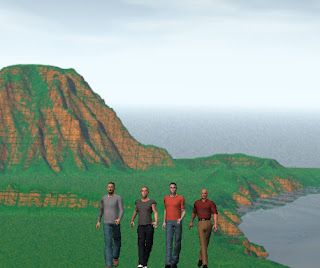In the second half of the twenty-first
century, the world underwent dozens of shattering upheavals. The
great world powers were broken into tiny pieces by wars and
revolutions. Two great genetically engineered epidemics killed a
large fraction of the world's population. The world nearly ran out of
the most convenient fossil fuels. There was a global economic
collapse. Coastal cities were devastated by global warming. The
world that emerged in the twenty-second century was a dark,
disordered world almost unrecognizable from the world that existed a
century earlier.
In the middle of the twenty-second
century a group of four men lived in the land that was once known as
the United States of America. Being miserable in this shattered
society, the four men obtained a small boat, and set sail
out into the Pacific Ocean. Their names were Bill, Carl, Walter, and
Sam.
The men had only a compass and a map to
guide them on their voyage. The GPS system had long since gone down.
The men had heard that Hawaii was very beautiful, so they decided to
navigate to that location, even though they had no knowledge of what
type of society Hawaii had.
After a long voyage the men finally
approached one of the islands of Hawaii. But a terrible storm arose
as night fell. There was heavy rain, gale-force winds, and high
waves.
“Let's guide the boat towards the
shore,” said Walter. “If things get too rough, as a last resort
we can take the raft to the shore.”
The men tried to bring the boat into a
safe place where they could throw down their anchor. But being unable
to see in the darkness, they struck a group of rocks near the shore.
Water started to pour into the boat. The men tried to bale water from
the boat, but it was a lost cause. The boat began to sink.
“Let's jump in our raft, and paddle
for the shore!” said Carl.
The four men jumped in a rubber raft,
and paddled to the shore, which they reached after being tossed
around violently by the high waves. Exhausted but safe, they all made
it to the dark beach. The men turned their rubber raft upside down,
and used it to protect themselves from the heavy rain. Very tired,
they all fell asleep.
The next morning they looked around at
their location.
“This is fantastic,” said Bill.
“It's as beautiful as I thought it would be.”
The men walked away from the beach, and
began exploring.
They came to a hill which overlooked a
village. The men looked down at the village. They saw dozens of
people, but all of them were women.
“Looks like it should be real easy to
get a date tonight,” laughed Bill. “Let's go down there.”
The men headed down to the village.
Soon they attracted a crowd of onlookers. All in the crowd were
women. Some of the females looked at them with fascination, but
others looked at them as if they were circus freaks or monsters.
Finally one of the women spoke.
“We know your type,” said the
woman. “You are men. Men are forbidden on this island. You must
leave immediately.”
“Men are forbidden?” said Bill.
“You mean there are no men on this island?”
“None,” said the woman. “Our
society has no men, and has had no men for fifty years.”
“We can't leave,” explained Carl.
“We came by boat, but our boat sunk just before we got here.”
Two authorities arrived. They placed
the men under arrest, and took them to the main town on the island.
“We must hold a hearing to decide
what will be done with you,” said one of the authorities.
The hearing was held in a large room
that was filled with 30 women. An official announced the arrival of
an important person.
“All rise for her excellency the
Island Ruler,” said the woman.
The Island Ruler entered the room,
dressed in silver colored robes. Sitting on a special chair, she
addressed the crowd.
“Fifty years ago when the Earth lay
shattered by war and disasters, our special society was founded,”
said the Island Ruler. “We recognized that the Aggressive Male is
the main cause of wars that devastate our planet. We decided to put
in place a purely female society, one that would be dedicated to
peace. So we established the Supreme Law of our island – that no
men should ever live on it. For fifty years we have forced all male
visitors to leave, or face imprisonment.”
“Prisoners,” asked the Island
Ruler, “do you have any boat or ship to leave our island?”
The men answered that their boat had
been lost when they reached the island.
“Then you are sentenced to jail until
such time as some other ship may come, a ship that would be willing
to take you when it leaves our island,” said the Island Ruler.
The four men were thrown in the local
jail. Upon being locked up, they had some questions for the jail guard.
“I've seen many young girls on this
island,” said Carl. “If no men have lived here for fifty years,
how were all these children conceived?”
“By artificial insemination, of
course,” explained the female guard. “When we started our
society, we obtained a large supply of frozen sperm. Each female who
wishes to give birth has her ovum artificially fertilized in a lab.
We have a way of assuring that only females are born.”
“And how long should it be until a
ship comes to this island?” asked Carl.
“The world doesn't see much trade
these days,” said the guard. “Our little island only gets a ship
maybe once or twice a year.”
The four men sat in jail for four
miserable months. Then one day there was a dramatic change in their
fortune.
“You are free to go,” said the jail
manager. “Her excellency the Island Ruler has decided that
from now on men will be allowed to live and mate on our island.”
The men started laughing, and high
fived each other.
“What made her change her mind?”
asked Bill.
“We ran out of something that we
consider an essential element in a happy all-female society,” said
the jail manager.
“Ah, so you ran out of frozen sperm,
right?” said Bill.
“No, we ran out of vibrator
batteries,” said the jail manager.
Walking out of jail, the four men
blissfully imagined their fortunate future as the only men on a
beautiful Hawaiian island filled with women who would be happy to
cavort with a male for the first time.











